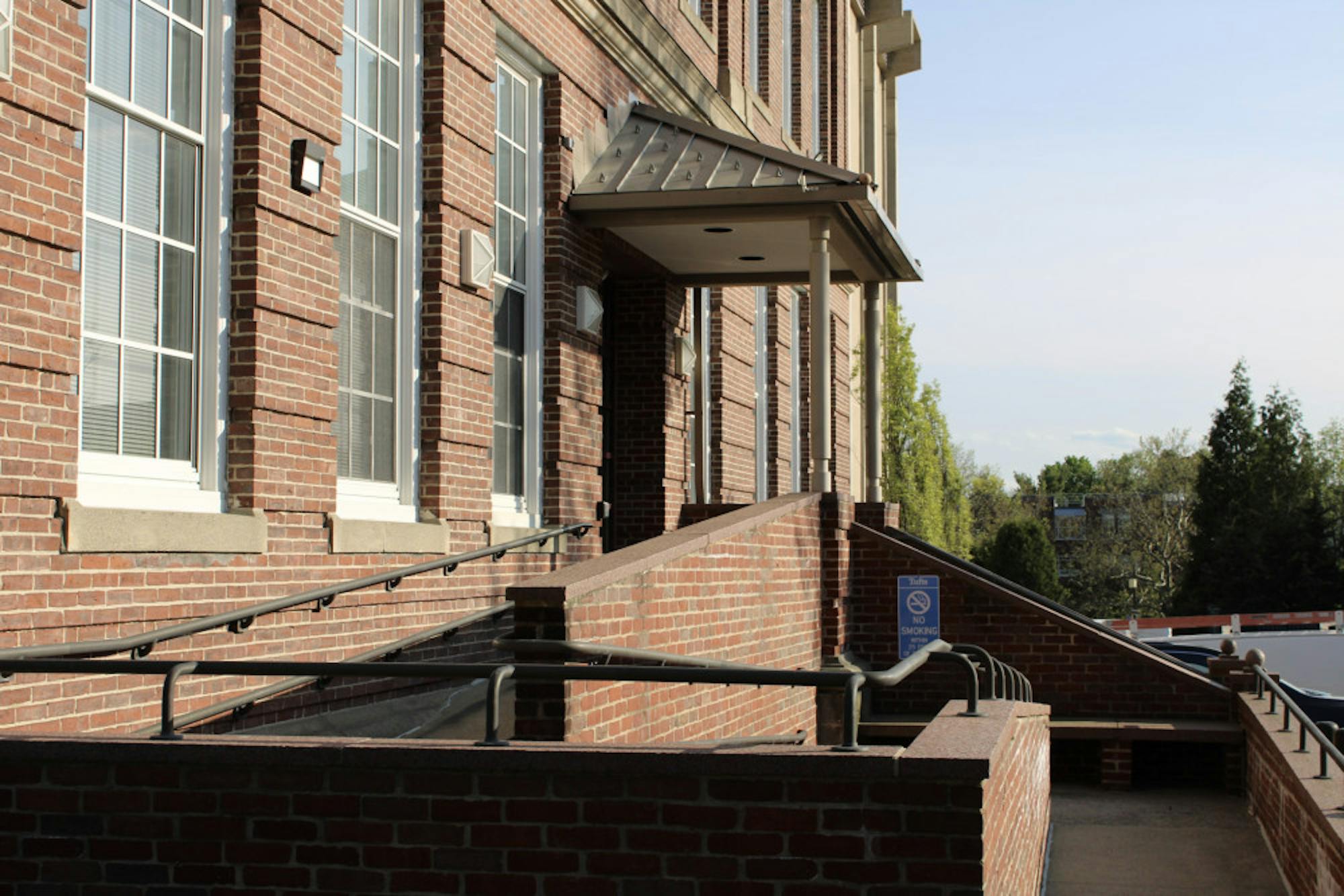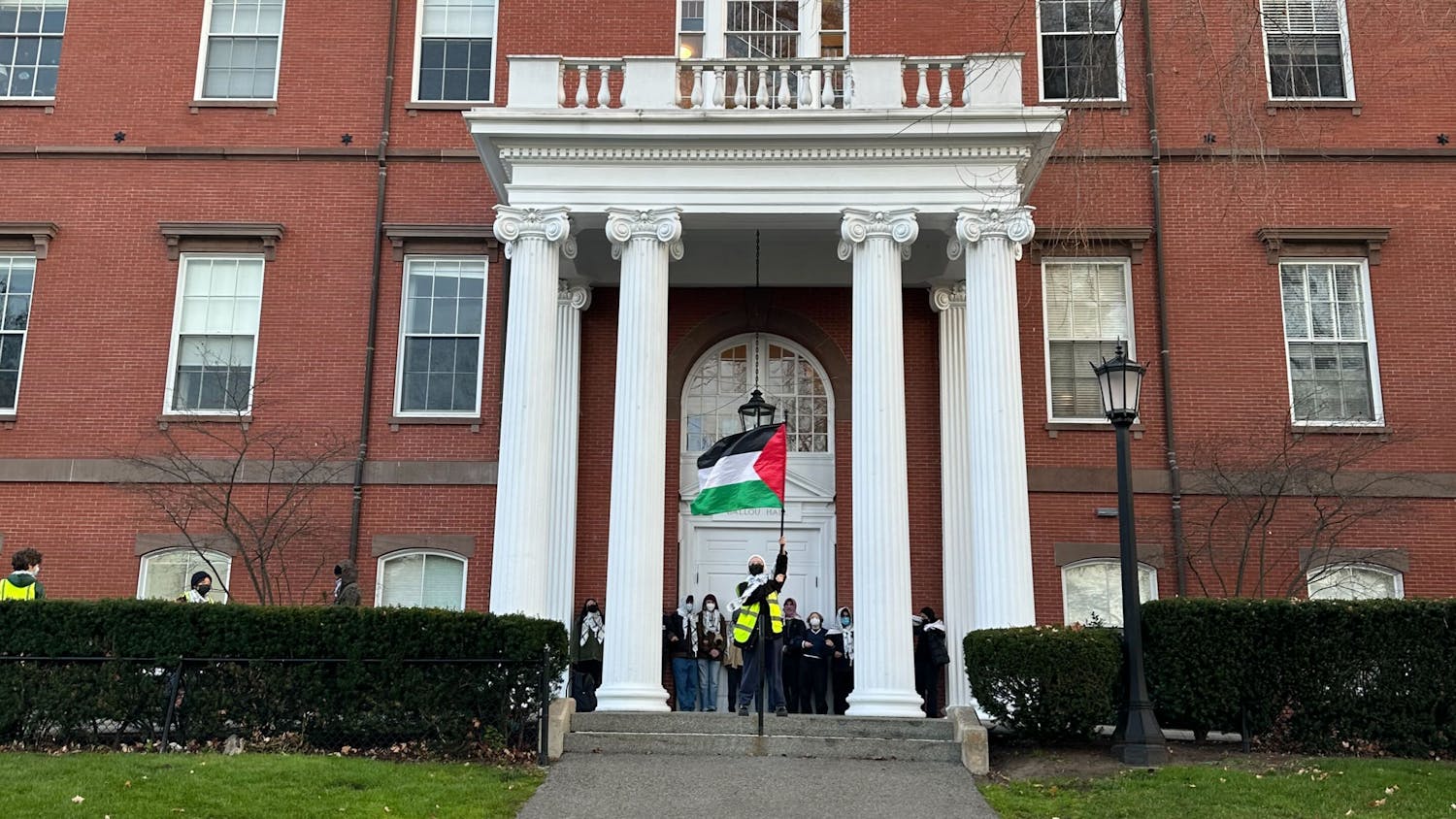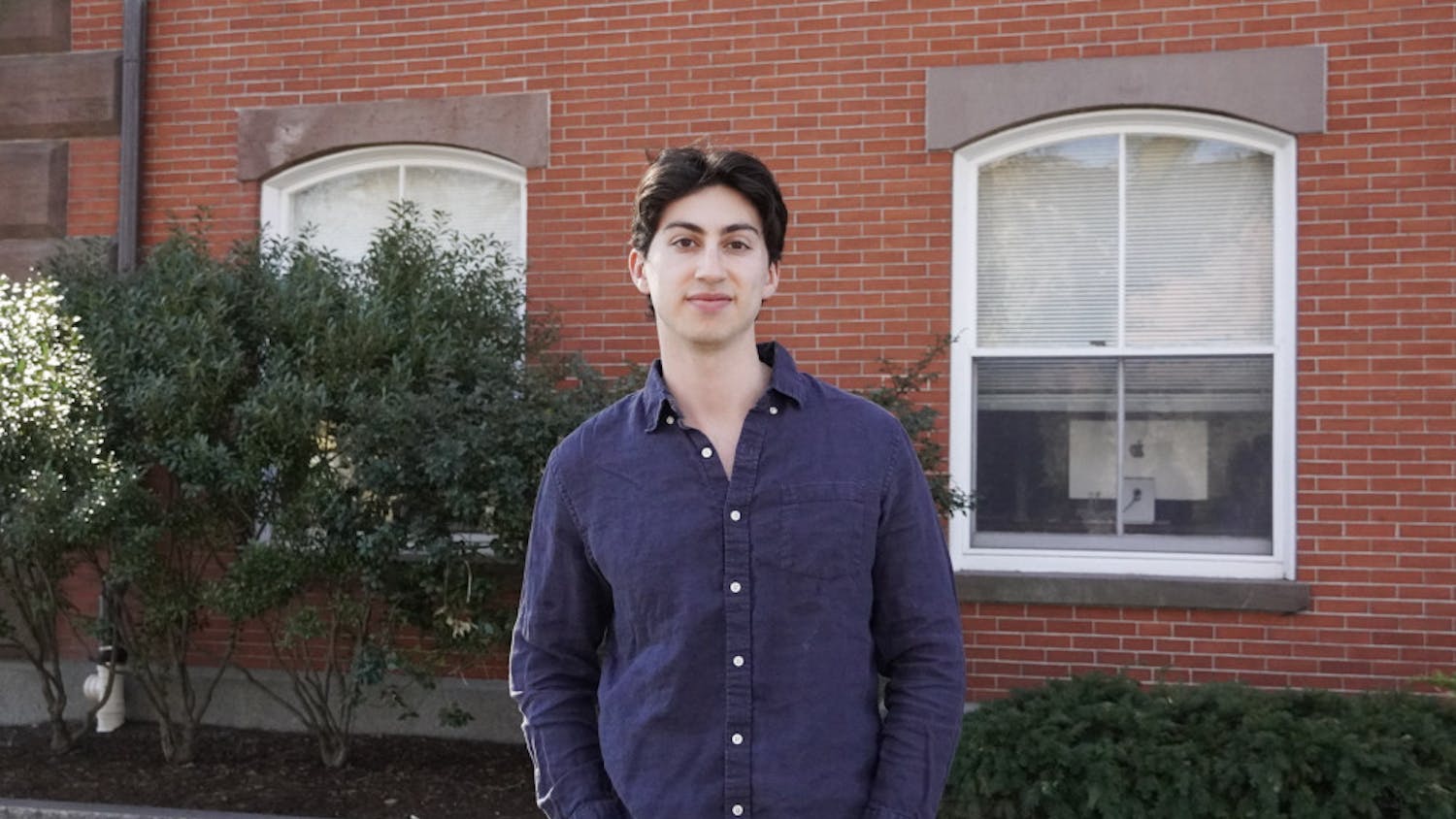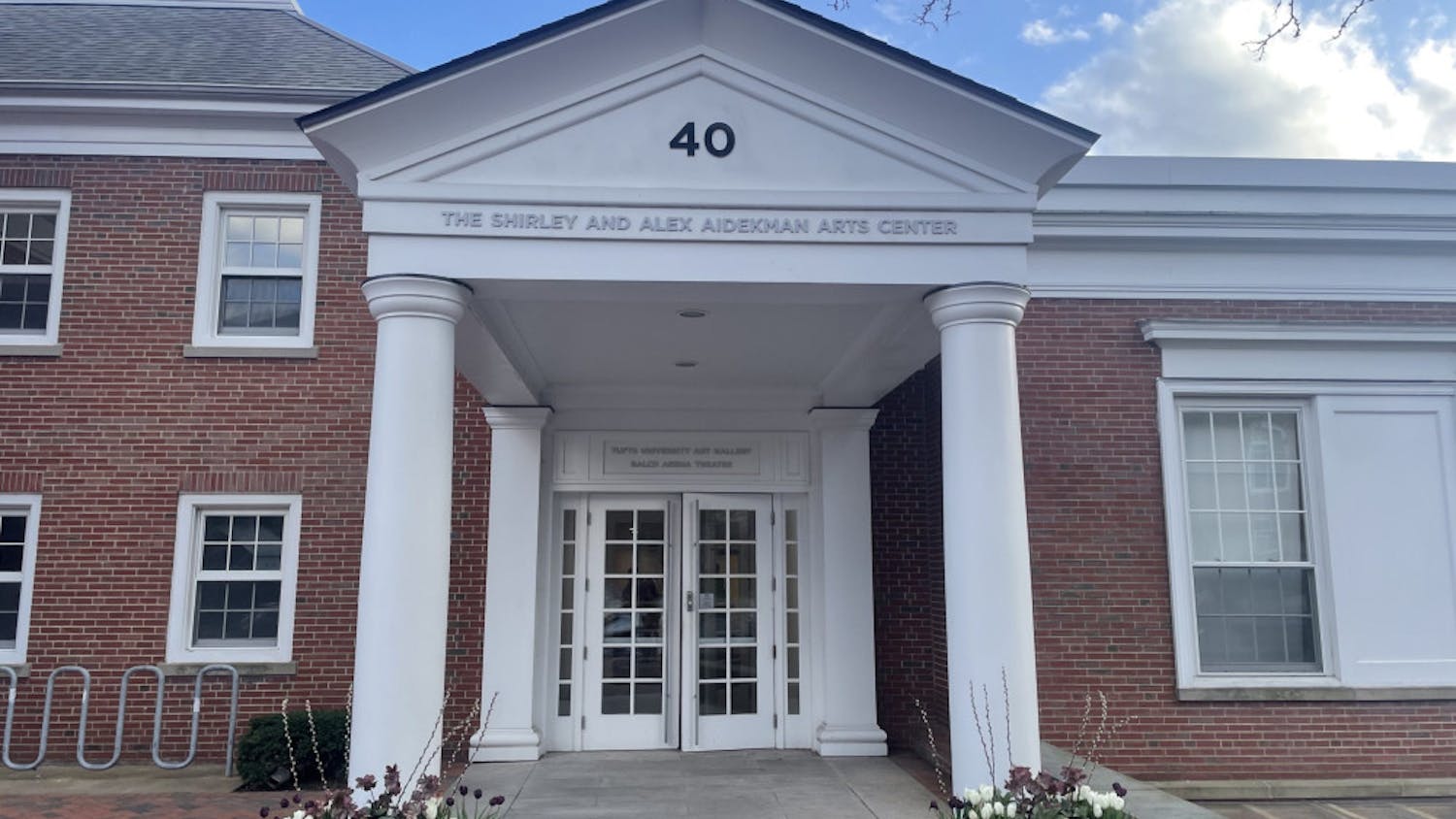One evening last semester, former Tufts sophomore Morgane Hanley was on their way to their 6–9 p.m. lab, only to find that the accessible entrance that they typically used to enter Pearson Hall was locked.
The entrance that Hanley, who is physically disabled, was taking was the accessible entrance into Pearson. It is a side entrance with a ramp and a push button that automatically opens the door. According to Hanley, there was a sign on the side of the building that stated that this entrance was locked after 5 p.m.
“I was able to reach out to the StAAR [Student Accessibility and Academic Resources] Center and they were able to get that changed — now it’s no longer locked,” Hanley said. “[But] it was really disheartening for it to be my responsibility to have to change that and for me to have to be going to my class and face that barrier.”
Inaccessible infrastructure on campus limits access to various on-campus structures
For Hanley, moments like this have been commonplace throughout the 1 1/2 years they spent as a Tufts student.
“I have had to report many, many broken accessible door opener buttons, for example,” Hanley said. “Sometimes several times a day at Tufts I would just be navigating campus [and] going to different classes, [and] I would run into several broken working buttons on campus, which is really unfortunate when that’s something that really helps me navigate a space.”
In the fall semester, Hanley recalls that there was no system implemented by Tufts Facilities to routinely check the accessible door buttons.
“It was my job to then report [broken buttons] to either StAAR or directly to facilities and they would be in charge of fixing that,” Hanley said. “[That] is understandable; however, when that’s happening many times a day … that can really take a toll.”
Greg Walters, the senior director of Facilities Services at Tufts, wrote in an email to the Daily that facilities is planning to add a system to check buttons on a periodic basis soon.
“Facilities is adding the push buttons to their preventive maintenance plans to check them on a periodic basis for proper operation and function,” Walters wrote.
Walters added that if a student encounters a broken button they should submit a work order to facilities either online, through the Facilities Service Request System or by calling the Operations Control Center.
“We strive to make our facilities as accessible and welcoming as possible to all, so we appreciate hearing from community members when they notice a problem such as an inoperative door push button,” Walters wrote. “If there is a request to add a push button opener to an existing door, these are best placed through the StAAR Center.”
Hanley explained that repeatedly encountering broken door buttons took an added unnecessary toll on their ability to navigate campus each day.
“It shouldn’t be on the disabled person to have to report that,” Hanley said.
The Daily asked Associate Dean of StAAR Kirsten Behling what a student should do when an accessible door button is broken.
“The best thing to do is submit a Facilities Service Request. You can also let us know and we will contact facilities as well. Finally, Tufts has a barrier reporting form that we check daily,” Behling wrote in an email to the Daily.

In addition to inaccessible entrances, certain infrastructure inside on-campus buildings present barriers to accessibility as well.
Noe Montez, chair of the Department of Theatre, Dance, and Performance Studies, highlighted the challenges of navigating the Jackson Performance Hall.
In order to access Jackson’s dance labs, most entrances require using stairs. Without the use of stairs, one has to navigate a back entrance, wait for an elevator and enter a tight space.
Montez explained that the theatre department would like to make the space more accessible, but the outdated infrastructure makes that difficult.
“We’re trying to do things to make our spaces accessible as much as we can but what’s really needed is a significant infrastructure [update],” Montez said.
Students on campus have had difficulty acquiring accommodations
Beyond issues with navigating on-campus infrastructure, Hanley also encountered difficulties with the StAAR Center’s accommodation process. Their biggest problem with accommodations was with the opportunity to have an in-class note-taker.
Hanley explained that the note-taker program is set up on a volunteer basis, meaning that they did not receive notes until another student in the class volunteered to take notes for them.
Last fall, they recalled that they did not receive notes for their Global Environmental History class until November.
“I’ve had many instances where at least once a semester, two months into my courses, I still didn’t have notes for a class,” Hanley said.
Hanley explained that they felt their overall experience at Tufts was marked by continuous self-advocacy in order to acquire the accommodations they needed to succeed academically.
“Everyone’s accommodations and situation looks different, but to me there isn’t that: ‘Oh, we hear you when we’re going to try to make change, and this is what we’re doing,’” Hanley said. “Of course, in a university setting, change can take a long time, and I understand that, but this is what I need to be a successful student and to show up every day.”
Ultimately, Hanley decided to transfer schools, citing Tufts’ accommodations services as a primary factor. When Hanley spoke with the Daily, they were in the midst of officially transferring colleges while taking courses at their local community college.
“The underlying reason I decided to leave Tufts was because of the difficulty I had with the accommodation services and just the toll that [that difficulty] was taking on me, not only physically … but also the toll that [it] was taking on my mental health,” Hanley said. “A lot of these issues are unfortunately in other colleges as well … [but] I felt like I did deserve a better environment.”
This difficulty with requesting accommodations is an experience shared by a Tufts first-year student who wished to remain anonymous and will be referred to as Bella throughout this article.
When she was accepted to Tufts, one of the first things Bella did was reach out to StAAR to begin the process of requesting accommodations for her hearing aid, among other accommodations.
“I applied to Tufts ED II and right after I received my decision, I pretty much turned around and emailed the StAAR Center, asking to set up a meeting,” Bella said. “That meeting was held in February of last year. That meeting did not go very well. It seemed right from the get-go that accommodations were going to be a barrier.”
She explained that the StAAR Center told her that the accommodations process typically starts in the summer before school begins, but the student explained that she needed assistive technology and that starting the process the summer before school began might be too quick of a turnaround.
Behling discussed the typical process the StAAR Center follows when students begin to request accommodations in the email.
“Students who need academic accommodations are more than welcome to connect with us when they decide to come to Tufts in May,” she wrote. “However, we recommend that we wait to meet about academic accommodations until August, so that the resources are more front of mind. If a student wants to meet earlier that is fine too. We also meet with a lot of [prospective] students as they look at and consider Tufts.”
Bella described that she was unable to retrieve information from the StAAR Center on which hearing aid brand she should get. At the time, she was choosing between two of the top hearing aid brands — Oticon and Phonak, both of which she described as being mostly only compatible with their own brand of equipment.
She explained that since she needed a hearing aid before the first day of school and the inner ear piece is custom built. The student decided to select a brand based on recommendations from her audiologist. As she arrived on campus, Bella realized that the equipment at Tufts was not compatible with their new custom hearing aid.
“[My audiologist] mostly works with Oticon so we got an Oticon,” Bella said. “Well guess what? [Tufts doesn’t] have Oticon equipment.”
She said that throughout the semester the StAAR Center contacted her with different ways to implement assistive technology that is compatible with Oticon, but the different suggestions were types of assistive technology that she explained would not work for her. She said that as a result she went the first semester without in-classroom assistive technology.
She stated that the center tried to have her personal audiologist give a recommendation for assistive technology, which according to her is not a job function of her audiologist.
“They were trying to make my personal audiologist give a recommendation on assistive technology and I’m like, ‘That’s not her job. That’s a different job title,’” Bella said. “It’s two different things. One person does the hearing aid and one person does the [assistive] technology.”
When asked if there is a person on StAAR’s staff who specializes in assistive technology, Behling wrote that all StAAR Center staff are trained in assistive technology.
“Each team member is trained, and consistently up-dated, in assistive technology,” Behling wrote. “We took this approach so that we can work with a student in the moment and not have them have to come back for another appointment.”
Bella went on to describe that the StAAR Center proceeded to propose a few other technology ideas that might work with Oticon, none of which were adequate.
She explained that she understood one proposed solution would have required every person in her class to hold a device to speak into and press a button when they talk for the entire duration that they spoke. It would have also required Bella to wear equipment herself.
“It was asking a lot of other people, and assistive technology is not supposed to do that,” she said.
Ultimately, Bella decided to retrieve an assistive technology recommendation from elsewhere and has assistive technology that doesn’t work for all of her classes.
Students on campus are sometimes unaware of what accommodations Tufts offers
Jessie Goober, who uses both she and they pronouns, started the student organization Access Betters the Lives of Everyone during their first year at Tufts.
Goober, a senior, stated that one of the goals of ABLE is to create a physically accessible Disability Center to provide people on campus with disabilities a comfortable and safe space. She described that it is not in the StAAR Center’s capacity to generate a sense of community for students with disabilities, which she hopes the creation of a Disability Center could provide.
“There’s a lot of misconceptions about what the StAAR Center does,” Goober said. “They used to be called SAS, which was Student Accessibility Services, but they actually merged with another organization called ARC … [which] used to be the tutoring [center].”
When asked why SAS and ARC merged, Behling explained the move was made to create an easier process for students.
“The merge allowed us to create a more streamlined process of support for students, to educate the entire staff as to what we each do, and to creatively collaborate around new programs/ resources that students were asking for and need,” Behling wrote.
Goober explained that in their opinion, the merger makes it so that the center is not specialized for students with disabilities.
“Now they are no longer an organization just for students with disabilities,” Goober said. “They’re for all students.”
Goober illustrated how a Disability Center would also be able to advocate for students with disabilities and help students in navigating the accommodations process.
“There’s no checks and balances for the StAAR Center,” they said. “If I don’t get my accommodation for any reason, I don’t have anyone to go to; the only person I can go to is StAAR.”
To help students obtain accommodations, Goober pulled together various resources on Tufts’ accommodation request process into a Google Drive folder.
“When you apply [for accommodations] it’s really confusing,” Goober said. “It’s not that they don’t know how to — they do. It’s just the way that [StAAR is] sending the information out is … not in an easily accessible way like in a Google folder like the one I just made.”
Behling encouraged students who are not able to get accommodations approved to follow StAAR’s grievance process.
“If a student does not get the accommodations that they asked for, they are more than welcome to follow our grievance process,” Behling wrote. “We frequently work with students who need accommodation adjustments based on their disability, or the classes that they are taking, or their study abroad experiences, etc. Students should come back as often as they like to work through any new accommodation needs that arise.”
Goober explained that part of what makes the accommodation process so frustrating is that students often have to keep pushing to figure out how to properly articulate what they need.
“There’s no list of accommodations, there’s no ‘this is what you could have,’” Goober said. “It’s like [they’re] gatekeeping resources.”
When asked whether the StAAR Center provides students with a list of accommodations, Behling stated that the StAAR Center prefers speaking with students rather than using a standard list.
“We don’t have a standard list of accommodations. Instead, we speak with each student individually to see what they might need and then go from there,” she wrote. “Often we need to create new accommodations specific to their needs.”
However, Behling added that based on student feedback the center will begin to list accommodations on their website beginning this summer.
“We will put examples of the types of accommodations that some students use on our website this summer,” she wrote. “This is a result of student feedback that we have received.”
Hanley shared a similar sentiment with Goober, in that while at Tufts they often felt left in the dark about certain accommodations they could ask for.
“Sure, [StAAR’s] suggestions were helpful but there were other things that I had no idea that were even possible or that I could ask for,” Hanley said.
They went on to contrast this experience with Tufts accommodation process with their accommodation at the school Hanley currently attends.
“Where I’m at now … we went through all the accommodations that the school offered and we talked through [them], and [the school’s accessibility representative] was like ‘tell me what you might need,’” Hanley said. “And just having that already made a huge, huge difference.”
Moving forward?
Jose Armando is a Class of 2026 TCU senator who has helped to bring many different projects related to disability to the forefront.
To assist with campus mobility, Armando, a first-year, is working on putting together a project called Ride the Hill, which would provide a Tufts-managed shuttle service to take students to different stops around campus.
Tufts currently has a Lyft program that students can use to get around campus. Behling explained that this program was the result of an alumni gift.
“If the Lyft accommodation is appropriate to help them navigate an access barrier, we will give them a monthly credit for use of Lyft. Students may take Lyft anywhere within a 1.5-mile radius of the campus center (this will help to get them to Davis for the Redline),” Behling wrote. “The idea behind the Lyft accommodation is that it provides flexibility in terms of where, and when (rather than waiting for a shuttle) a student can access campus.”
Bella has used the Lyft program before, but said that the program is difficult to use due to Lyft being a third party company.
“The tips come out of your own pocket … and you can’t just not tip,” she said. “One time the app went down, and I was by the SEC, and I was trying to get to a religious event, and I was stranded there. I called the StAAR Center and they would not help me.”
Armando cited a recent TCU survey, which found that 51% of students wished there were more shuttle stops around campus. He highlighted the ways in which he hopes the Ride the Hill project will aid students.
“Ride the Hill, for me, is a way to bring support to students who have mobility issues or physical disability,” Armando said.
In addition to the Ride the Hill project, Armando is supportive of ABLE’s quest to create a Disability Center, partly due to his own experiences with the accommodations process.
“The problem is in order to get accommodations, you have to prove that you need the accommodations, and that can take months,” Armando said. “The StAAR Center [provides] great services, but the problem is that they don’t focus on the topic of disability.”
This semester, the TCU Senate established a disability community senator. Tufts’ first disability community senator is sophomore Itamar Oelsner.
Oelsner stated how he hopes his position will support students with disabilities in getting necessary resources.
“There’s a lot of things that the administration does to make sure that students have what they need in order to succeed, but there’s definitely room for improvement,” Oelsner said.
Oelsner’s hope that Tufts can see the benefit that establishing a Disability Center would have for the student body.
“I think the administration needs to recognize that this is a serious want and a need from students on campus, and a lot of people could benefit from it,” Oelsner said.
Bella noted that although Tufts may not be able to change its landscape, there is a lot the school could still do to better accommodate students.
“Obviously Tufts is built on a hill — you can’t knock down the hill,” she said. “But there are things that you can do to help people navigate life here to where it doesn’t hurt them or negatively impact them.”






